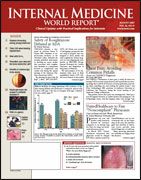Publication
Article
Internal Medicine World Report
PPI Therapy Not Linked to Pneumonia Risk in Older Adults
Author(s):
New Data Question Earlier Claims of Increased Risk
By John Schieszer
SEATTLE—There does not appear to be any significant association between gastric acid suppressive therapy and susceptibility to community-acquired pneumonia (CAP) in older adults, according to the results a new retrospective study presented at the American Geriatrics Society annual meeting.
An earlier study (JAMA. 2004;292: 1955-1960) reported that current use of gastric acid suppressive drugs—either proton pump inhibitors (PPIs) or H2-receptor antagonists—was associated with an increased risk of CAP compared with nonuse. In contrast, the new study found that although PPI users had a significantly higher incidence of congestive heart failure (CHF), anemia, gastroesophageal reflux disease (GERD), and hypertension, the incidence of pneumonia was similar to that of nonusers.
IMWR
"This study has rather stringent criteria for the diagnosis of pneumonia, which may also help explain these findings and allow for stronger correlations and strength," lead investigator Jen-Tzer Gau, MD, PhD, of Ohio University College of Osteopathic Medicine, Athens, told .
Investigators reviewed the medical records of 350 adults aged ≥65 years who were admitted to a community hospital during 2004. Of these, 79 patients met the criteria for pneumonia, defined by the presence of a new infiltration on a chest radiograph, as well as the clinical presentation. The control group consisted of 271 patients who were not admitted for pneumonia, acute exacerbation of chronic obstructive pulmonary disease (COPD), or aspiration pneumonia during the same 12-month period.?Patients who died during their hospital stay or were diagnosed with aspiration pneumonia were excluded.
Demographic data, medical history, and the use of a PPI or other medications before hospital admission were recorded. Analyses included length of hospital stay and admission blood test results.?
PPI users (n = 148) had a higher incidence of CHF (31% vs 14%), GERD (60% vs 10%), and anemia (18% vs 8%) than non?PPI users (n = 202). PPI users had a higher mean serum potassium level (4.3 vs 4.1 mEq/L) and a longer hospital stay (5.5 vs 4.2 d) than non-PPI users. However, the incidence of pneumonia was not significantly different between the 2 groups (26% vs 20%).
Nevertheless, the 79 patients with CAP were significantly more likely to have a history of smoking, CHF, coronary artery disease, previous pneumonia, COPD, higher white blood cell count on admission, and longer hospital stay (6.5 vs 4.3 d) than the control group. The rates of PPI use and a GERD diagnosis were similar in both groups.
IMWR
"We looked at patients using any type of proton pump inhibitor," coinvestigator?M. Salman Khan, a medical student at the same institution, who presented the data at the meeting, told .?"These findings should be reassuring."
He said one possible explanation for these findings may be that gastric acid suppressive therapy may decrease the frequency of reflux episodes, thus lessening the risk for microbial aspiration. However, he cautioned that more research is needed.
Coinvestigator and medical student Utkarsh Acharya pointed out that GERD, and PPI treatment for GERD, are prevalent coexisting entities in the geriatric population.
The investigators note that although the findings are not conclusive, physicians can feel confident prescribing PPI therapy for older adults based on these results, knowing that these agents do not significantly increase the risk of pneumonia.





